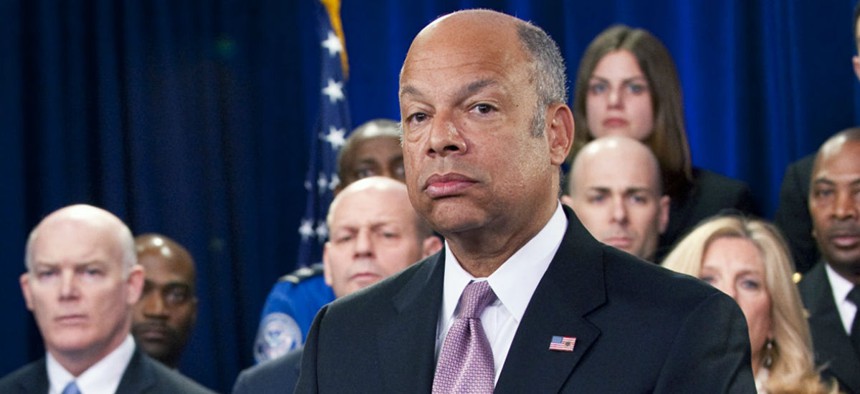
DHS Secretary Jeh Johnson Barry Bahler / DHS
DHS Allowed Employees to Stay on Paid Leave for Years While It Investigated Misconduct
Three in 10 employees on admin leave for more than one year returned to their jobs anyway.
More than 100 Homeland Security Department employees spent more than one year on paid leave while not working between 2011 and 2015, according to a new report, costing DHS nearly $20 million.
DHS placed the employees on administrative leave for “personnel matters,” primarily during misconduct investigations but also including fitness for duty and security clearance issues. About six in 10 of the employees had wound up being separated after their paid leave, at the time of the Government Accountability Office’s audit, while 12 percent remained on paid leave. About 30 percent were back at work, while a small fraction faced indefinite suspensions.
GAO’s report comes as the perceived overuse of administrative leave has drawn the ire of -- and bipartisan action from -- Congress. Committees in both the House and Senate have passed their own versions of legislation to mitigate the use of the unlimited paid time off.
A House bill sent to the floor for full consideration would hinder an agency’s ability to place an employee on administrative leave for “reasons relating to misconduct or performance” more than 14 days in one year. After 14 days, agencies would be required to place employees back on paid duty status. The Senate version would limit agencies to using the practice five days at a time. It would also create two new leave categories -- investigative leave and notice leave -- provided agencies meet specific criteria and are unable to use other available options.
The Obama administration has also taken steps to rein in the “abuse” of administrative leave, issuing guidance in 2015 to better define the practice and tell agencies to use it less frequently. OPM “strongly recommend[ed]” agencies consider other options aside from administrative leave, such as leave without pay, indefinite suspensions or firing the employee without notice if there is “reasonable cause to believe the employee has committed a crime” for which he or she could go to prison.
DHS appeared to have been guilty of abusing administrative leave, with GAO finding cases in which, for example, an employee was on paid vacation for more than three years while collecting nearly $500,000 in salary and benefits. The employee was under investigation for “criminal and administrative misconduct,” GAO said. In another case, DHS revoked the security clearance of an employee who worked in a position that required one, but the employee stayed on administrative leave for 18 months while he appealed the decision. Eventually, DHS fired the individual.
Not everyone was eventually dismissed, however; one employee stayed on administrative leave for three years while collecting $340,000, after which DHS determined it did not have enough evidence to fire or suspend him and he was returned to duty.
In many cases, GAO cited the lengthy appeals process and a lack of alternatives as responsible for employees’ extended stretches on administrative leave. In some instances, however, department inefficiency was to blame. In one case, for example, the supervisors investigating an employee’s misconduct left DHS and never appointed successors to conclude the process. The employee languished in administrative leave for months before anyone noticed.
In September, DHS for the first time issued guidance regarding the use of administrative leave. The policy emphasized the practice should only be used for short periods of time, with instances of extended use limited and requiring “elevated management approval.” The guidance also called for more reporting from the component level.
GAO said DHS’ policy was a positive first step that should be taken further. The auditors recommended the department’s chief human capital officer continue to evaluate the use of administrative leave to identify ongoing inefficiencies and propose future changes. DHS agreed with the suggestion, saying it would monitor the implementation of its new policy.
NEXT STORY: Play of the Day: Apple and the FBI Trade Barbs







